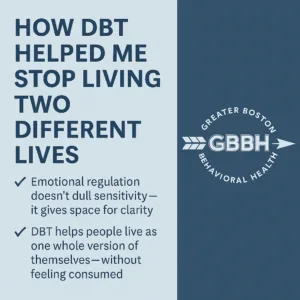There was a time I didn’t know how to exist without switching masks.
By day, I was the version of myself everyone seemed to like—charming, talkative, quick-witted. I threw myself into work, art, relationships, all of it. But inside, I was spinning. Emotional overload was the default, and when things got too hard, I’d retreat into isolation, shame, and emotional shutdown. I had two lives: the one everyone saw, and the one that lived in my head.
What scared me most about getting help was this thought I couldn’t shake:
“What if I heal and lose the parts of me I actually like?”
I wasn’t just afraid of therapy. I was afraid of being changed beyond recognition.
But then I found Greater Boston Behavioral Health, and through DBT—Dialectical Behavior Therapy—I found something I didn’t even know I was allowed to want: a life that felt whole, not fractured. A way to stay fully me, without burning out from it.
I Thought I Had to Choose Between Healing and Being Myself
There’s a quiet kind of shame that comes with being “too much.” Too emotional, too sensitive, too reactive. I wore that label like a second skin, always trying to calibrate how much of myself I could show before it became “too hard” for other people.
But the worst part? I thought those extremes were where my creativity came from. I honestly believed that regulating my emotions would silence the part of me that could write, perform, create—feel.
So I stayed stuck. Stuck between craving stability and fearing it. Between longing for peace and assuming that peace would make me boring, numb, less alive.
What DBT Actually Gave Me: A Way to Feel Without Falling Apart
DBT didn’t ask me to become someone else. It helped me come back to myself—fully, kindly, and without judgment.
In our sessions, I learned skills I had never been taught before. Things that sound small but change everything:
- How to name what I was feeling instead of getting swallowed by it
- How to pause and breathe before reacting
- How to sit with emotional pain without needing to numb it
- How to believe that two things can be true at once: “This is hard” and “I can handle it”
DBT gave me tools that didn’t erase my feelings—they made them manageable. That’s a quiet kind of miracle.
I Stopped Living in Emotional Extremes
One of the first things I learned in DBT was about the “dialectic”—the idea that two seemingly opposite things can both be true. I can love someone and need to set boundaries. I can be angry and still communicate with care. I can be deeply emotional and grounded.
This was the first time anyone told me I didn’t have to choose between falling apart or shutting down. There was a third option: staying present.
That shift didn’t just help me survive. It helped me stop hiding from my own life.
My Creativity Didn’t Go Away—It Got Clearer
I won’t lie: there were moments I feared I’d lose my edge. That if I stopped spinning out emotionally, I’d stop caring. But here’s what happened instead:
I started creating from a place of clarity instead of chaos.
The ideas didn’t stop—they just stopped hurting so much.
It turns out, emotional regulation doesn’t dull your sensitivity. It gives you space to use it more intentionally. To create, love, and connect without feeling consumed.
I Didn’t Just Learn Coping Skills—I Learned How to Be Myself Safely
Before DBT, my relationships felt like walking through a funhouse of mirrors. I didn’t know which version of me would show up—panicked, numb, overgiving, shut down. I didn’t trust myself.
Through DBT, I started to build that trust again.
Skills like interpersonal effectiveness helped me speak up without guilt.
Mindfulness helped me stay in the moment instead of spiraling.
Distress tolerance helped me ride out the waves instead of being dragged under.
Most importantly, I learned that I was never too much. I just didn’t have the tools yet.
You Don’t Have to Split Yourself Anymore
If you’re reading this and you’re afraid that healing means losing something essential—your voice, your spark, your soul—I want you to know:
You don’t have to give up the parts of you that shine.
You just get to stop burning alone.
DBT doesn’t flatten you. It doesn’t numb you. It helps you live as one whole version of yourself—messy, beautiful, growing.
You are allowed to be sensitive and stable. Emotional and empowered. Creative and calm.
And if you’re in Boston or the surrounding area, you don’t have to do this alone.
DBT Services in Boston, MA at Greater Boston Behavioral Health
At Greater Boston Behavioral Health, our DBT program in Massachusetts is built for people who feel deeply and want to live fully. Whether you’re struggling with emotional overwhelm, relationship chaos, or identity confusion, we meet you where you are—with compassion, structure, and support.
You don’t need to hide who you are to heal.
You just need a place that understands how to help. And for those in Wellesley, Needham, Waltham, Newton, or West Roxbury, we have nearby locations to make care accessible.
FAQ: DBT for Emotional Intensity and Identity Fears
What is DBT?
Dialectical Behavior Therapy (DBT) is a type of therapy that helps people manage intense emotions, improve relationships, and feel more in control of their lives. It blends cognitive-behavioral techniques with mindfulness, and it’s especially helpful for people who feel emotions very strongly or fear emotional dysregulation.
Will DBT change who I am?
No. DBT won’t change your personality—it helps you build skills so you can stay connected to yourself without being overwhelmed. Many people actually feel more like themselves after learning DBT skills.
Can DBT help with creative burnout or emotional exhaustion?
Yes. Many artists, performers, and sensitive people find DBT incredibly helpful for managing the emotional ups and downs that come with their creative lives. It doesn’t take your depth away—it helps you use it wisely.
How long does DBT take?
It depends on your needs, but many people see progress within a few months. A standard DBT program may include weekly individual sessions, group skills training, and phone coaching. At Greater Boston Behavioral Health, we work with you to create a personalized path.
Is DBT available in Boston?
Yes. Greater Boston Behavioral Health offers structured DBT services in Boston, Massachusetts, with compassionate clinicians who specialize in helping people regulate emotions without sacrificing their identity.
Ready to stop living two lives?
Call (888) 450-3097 or visit to learn more about our DBT services in Boston, Massachusetts. We’re here to help you come home to yourself—fully, gently, and without shame.


